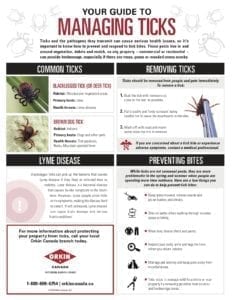Are ticks ticking you off? Ticks are not only a nuisance, but also can cause serious health issues with the pathogens they transmit. Knowing how to prevent and respond to tick bites is incredibly important to protect you and your family from these blood-sucking pests.
Habitat
From wooded and vegetated areas to the comfort of the indoors, ticks have the ability to live in many different locations. But one thing all ticks have in common is their use of our furry friends – deer, dogs and other pets – as a host. If given the opportunity, ticks will also jump on humans to secure their next meal.
Tick Removal
Because ticks can transmit Lyme disease and Ehrlichiosis, they should be removed immediately.* To remove ticks from a pet or person at home:
- Grab the tick with tweezers as close to the skin as possible.
- Pull steadily and firmly outward, being careful not to leave the mouthparts in the skin.
- Wash off with soap and warm water once the tick is removed.
*If you are concerned about a tick bite, contact a medical professional.
Prevention
Ticks are not seasonal pests, but they tend to be more problematic during the spring and summer when people are spending more time outdoors. If you enjoy spending your time outdoors, there are a few precautionary steps you can take to avoid bringing one of these hitchhikers into your home:
- Keep up with your yard’s landscaping and keep the grass mowed.
- Stay on paths when walking through wooded areas.
- Inspect your body, arms and legs for ticks when you return indoors.
- Keep pets away from wooded areas.
Download our Guide to Managing Ticks to learn how to identify these dangerous pests and help prevent them from impacting your household’s health.
You may also like
Top Pests Expected To Trend In The Summer Of 2023
Warm weather is around the corner, which means pests that have been overwintering or hibernating will wake up as well as non-hibernating pests will start making an appearance outdoors. Being prepared for those spring and summer pests can have an impact on how enjoyable your time will be at home or at work. Using industry leading expertise, we have put together a comprehensive list on the top 8 pests expected to trend in the summer of 2023. This list will provide a deeper dive into the impact that pests can have on your property, along with prevention tips to keep your home or business pest-free.
Top 7 Pests Predicted To Trend In 2022
From mosquitoes and wildlife to ticks and flies, being prepared for spring and summer pests can have an impact on how enjoyable your time outdoors will be. Do not worry you are not alone, as the experienced team at Orkin Canada is there to help you prepare. After doing thorough research, we have put together a comprehensive list on the top 7 pests expected to trend in the summer of 2022. This list will provide an in-depth look at the impact that pests will have on your home or business, along with also providing easy to use preventative tips.
How to Remove a Tick
After a day full of adventuring, playing or relaxing outdoors, the last thing you want to find is a tick sucking up your blood. While these pests don’t present much of a threat to well-built homes with maintained exclusionary measures, they can be found feeding on humans or pets after spending time outdoors in wooded areas. If you find a tick on yourself or your furry friend, it is important to remove it as quickly and safely as possible.
Avoid Painful Pests This Canada Day
Barbeques, fireworks, parades and…bug bites? While each of these activities are perfect for summer celebrations like Canada Day, summertime is also the ideal season for biting and stinging pests to come out in full force. Identifying which of these pests might make an appearance in your backyard can help you take the steps necessary to protect your home – and potential party guests – from their painful bites.
Remove pests from your home, and stop them from coming back
We work hard to listen, understand and assess your unique situation. Request a free, no-obligation estimate today for a customized pest program that fits your needs.
Request a Free Home EstimateRequest a Free Business Consultation


